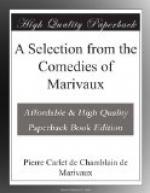[101] CE QUI EST DE SUR = Ce qu’il y a de sur.
[102] LE SUJET = La raison.
[103] DE BONNE MAIN, ‘By a reliable person.’ (Littre, “main,” 17º.)
[104] CONSENS... DE. The verb consentir takes either de or a, before a following infinitive, although in modern French the latter is the more common.
[105] TOUS PROCES. Later editions print tout proces, which is the more natural modern form. The plural, in the sense of ‘each’ or ‘every’ is, however, sometimes found without the article. Compare: “L’auteur des dialogues a dit que les belles sont de tous pays, et moi je dis que les sottises sont de tous les siecles " (Fontenelle, Jugement de Pluton).
[106] AVOIR PRISE ... AVEC, ‘To have a dispute with.’ PRISE, ‘Quarrel,’ ‘dispute’ (Littre, 6 deg., also Dict. de l’Acad., 1878).
[107] TOUS. Later editions print tout, which is the modern form. In the seventeenth and early eighteenth centuries is was not customary to consider the adverbial tout as necessarily invariable.
[108] MOUVEMENT. See le Jeu de l’amour et du hasard, note 162.
[109] DONT. Que is preferable. See Le Jeu de l’amour et du hasard_, note 175.
[110] SAVOIS. A not uncommon use of the imperfect indicative in the sense of the conditional.
[111] JE N’AUROIS QUE FAIRE DE. See le Jeu de l’amour et du hasard, note 68. Compare le Jeu de l’amour et du hasard, note 141, and le Legs, note 85.
[112] A TOI. The English idiom is ‘of you.’
[113] AU MOINS, ‘Nevertheless.’
[114] CAPABLE. Most editions print incapable, beginning the sentence with s’il, and punctuating with a comma after incapable. The sense is better carried out with such a rendering.
[115] Des biais = Des moyens detournes.
[116] L’EN DEDIRE = Le dementir.
[117] COMME S’EN ALLANT. See les Fausses Confidences, note 26.
[118] A CE QU’IL EST NE = A sa naissance.
[119] C’EST DE DORANTE, for Il est de Dorante: ’It has been painted by Dorante.’
[120] M’EN FAIRE ACCROIRE, ‘To impose upon me.’
[121] AVANT QUE DE. See le Jeu de l’amour et du hasard, note 93.
[122] This speech of Dorante’s and Araminte’s answer seem to have inspired Augier and Sandeau in the scene between Bertrand and Helene, in Mlle. de la Seigliere, Act III, sc. 7.
[123] QUE MON AMOUR N’EN AUGMENTE. See Le jeu de l’amour et du hasard, note 137.
[124] JE L’AI PEINTE. The peinte refers to and agrees with la in Dorante’s preceding speech.
[125] AVANT QUE DE. See Le jeu de l’amour et du hasard, note 117.




